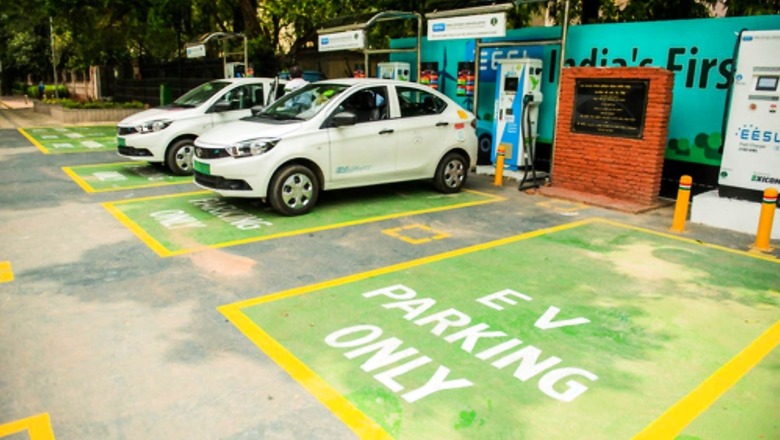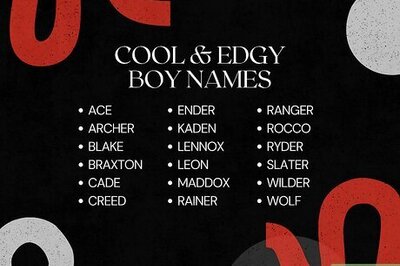
views
At least 54% of Indian consumers are worried about the quality of electric vehicles (EV) and not the range, while 50% of consumers are now open to purchasing, a recently released report by CyberMedia Research (CMR) revealed.
India’s EV momentum is increasing as a result of a robust government policy push, including its flagship EV programme or FAME, faster adoption and manufacturing of electric vehicles, and more automotive Original Equipment Manufacturers (OEM) prioritising EVs. This week, India’s top automaker Tata Motors announced that it has now rolled out 50,000 EVs from its facility in Pune and became the first company in India to hit this number.
Apart from Tata, there are other companies like Mahindra and Hyundai and players like Ola electric in the two-wheeler sector that are planning to introduce new EV models in the coming months.
News18 spoke to John Martin, analyst, smart mobility practice, CMR, regarding the behaviour of Indian consumers.
EXPERTSPEAK
“When it comes to electric vehicles, they prioritise quality and reliability. OEMs that deliver on these key value propositions are bound to win big. Despite EVs being in infancy, we are still seeing around 200% YoY EV growth. With new EV launches and product quality advancements, we will definitely see a steady growth increase in EVs,” Martin said.
According to the analyst, today’s EVs are fulfilling consumer demands with respect to range, performance, as well as advanced features and with proactive policy initiatives and cross-ecosystem collaborations, a surge in EV charging infrastructure across Tier 2 and 3 cities can be witnessed in coming years.
When asked whether the recent EV fire incidents triggered the quality concern, Martin said: “Yes, some of the recent unfortunate EV fire incidents have caused anxiety and doubts among customers.”
“However, I believe that these small hiccups are part of the growth pains experienced with any technology development cycle. When you look at diesel or CNG, there were issues with them, but they gained consumer trust with incremental technological maturity,” he added.
The expert also noted that with proactive government policy initiatives, OEMs will have advanced EVs and gain consumer trust. “Many OEMs have already developed technologies prioritising safety and performance. As we move forward, we foresee EV sales momentum to continue gaining traction,” Martin noted.
INDUSTRY’S VIEW
Pankaj Sharma, Co-Founder of Log9 Materials, told News18 that with the recent fire incidents, there is a definite concern among customers about quality.
Moreover, he said that the early players in the market are new entrants and hence there is an apprehension among customers on after-sales service, quality of the product and indemnity around the vehicle and the battery, which is at the heart of these EVs. “Indian customers are brand persona conscious. Especially in the vehicle segment, there is a deeper attachment to the legacy of the brand from which the vehicle is being manufactured and bought.”
According to him, in the two-wheeler segment, as the price of the vehicle is not high, customers are more open to trying new EV companies, while in the three- and four-wheeler segments, there is a definite push from the customer to buy EVs produced by more known brands.
Citing the concerns, highlighted in the report, Sharma said that one of the major components of the EV is the battery and safety. “A lot of young EV start-ups are simply importing cells and then creating battery packs from them to make an EV in-house. This can be a good strategy if the EV companies concentrate on getting the right engineering talent and production methods and quality checks on its battery design and production standards,” he added.
“However, this is not the case with all EV manufacturers right now and hence there are concerns in the market about the quality of batteries in EVs,” Sharma noted.
He also suggested that EV OEMs should work with high-quality battery companies to create a product in the market that not only would give power and performance for the vehicles but also “peace of mind to the consumer that once they buy an EV, they are safe, and they can depend on its performance”.
Regarding the fire-related concerns, another expert from the industry, Nitin Kapoor, Managing Director of Saera Electric Auto, stressed that such incidents have occurred in only a few vehicles and many incidents have been misrepresented, like a vehicle catching fire due to short-circuit might have been reported as a battery catching fire. “The players in the clean mobility sector are continuously making efforts to leverage best-in-the-market technologies to manufacture vehicles that are safe and secure. They are constantly working on designing technologically-advanced EVs to provide consumers with the best-in-quality and safe modes of transportation.”
According to Kapoor, EV players are focusing on creating a robust EV charging infrastructure and inducting cutting-edge technologies to make the batteries safe and durable, while the government has drafted new measures to enhance battery safety standards. “The new government regulation includes amendments on safety requirements like battery cells, battery management systems, on-board chargers, the design of battery packs, and thermal propagation due to internal cell short circuits leading to the fire, following these measures will certainly facilitate a faster penetration of EVs on Indian roads,” he added.
Read all the Latest Auto News here


















Comments
0 comment